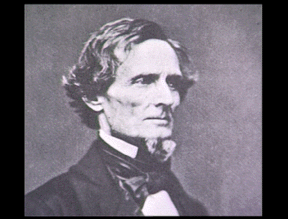![]()

Jefferson Davis (1808-1889) was born, like Abraham Lincoln, in Kentucky. His family seems to have been of modest circumstances, and soon moved to the newly opened southern frontier in Mississippi. Possessing great intelligence and imagination, Davis was educated at a number of institutions, including Transylvania University before entering West Point, from which he was graduated. Robert E. Lee was a fellow cadet.
Davis then served in the army at a number of posts in Wisconsin and Illinois, and he (like Lincoln) served in the Black Hawk War in 1832. He resigned from the army in 1835, married the daughter of Colonel Zachary Taylor, who was the commandant of Davi s's post at the time, and returned to Mississippi as a planter. Davis's marriage was cut short by his wife's sudden death three months later of malaria. For ten years, Davis tended to his plantation, "Brierfield," read extensively, and made only infrequent excursions outside his community.
In 1845, Davis strenthened his ties to the Mississippi planter class by marrying a woman from a socially prominent family. At the same time, his career became more public when he was elected to Congress as a Democrat. With the outbreak of the Mexican War, however, Davis resigned his seat in order to command a Mississippi regiment. His bravery at the battles of Monterrey and Buena Vista won him acclaim.
Davis was then elected to the United States Senate where he became a leading spokesman for southern rights. Although willing to accept the extension of the Missouri Compromise line to the Pacific, Davis argued the right of slavery to go into the territories, and he adamantly opposed the admission of California as a free state. Davis's stand proved too extreme for Mississippi in the aftermath of the Compromise of 1850. In 1851, in a complicated political maneuver, Davis stepped down as senator to run against a pro-compromise "Union" candidate for governor, and lost.
Davis's return to the life of a planter proved only temporary. In 1853 he became secretary of war in the cabinet of President Franklin Pierce, where he demonstrated his southern expansionist leanings. With the close of the Pierce administration, he returned to the Senate and became a leader of the southern Democratic defense of slavery and its constitutional right to protection in the territories. More controversially, he advocated the revival of th e slave trade.
Although he did not advocate immediate secession following Lincoln's election, Davis accepted his state's decision to leave the Union. With the formation of the Confederacy, he hoped for a high military position, and when news arrived at Brierfield of his selection as provisional President, his wife described him as "so grieved that I feared some evil had befallen our family." Davis, nevertheless, accepted the position, and on February 18, 1861 was inaugurated President.
Davis was described by a contemporary as "a gentleman," having a "slight, light figure, little exceeding middle height, and holds himself erect and straight." He had high, prominent cheek-bones, thin lips, and deep-set eyes, one of which was nearly blind from an illness. To all but a few intimates, Davis was reserved and severe in manner. Both indecisive and stubborn, his inflexibility, moral rectitude, and lack of humor did not help him in dealing with opponents.
Davis was passisonately committed to the cause of the Confederacy, and his labors on its behalf took a heavy personal toll. While contemporaries and, later, historians have found much to criticize about his leadership, most scholars consider that he guided the Confederacy as ably as one could expect, given its situation.
VIDEO: Jefferson Davis (5.4 MB)